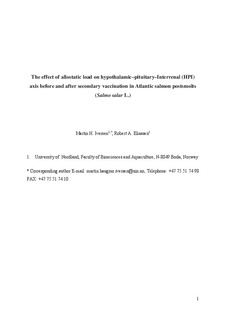| dc.contributor.author | Iversen, Martin Haugmo | |
| dc.contributor.author | Eliassen, Robert A. | |
| dc.date.accessioned | 2015-09-15T08:28:41Z | |
| dc.date.accessioned | 2015-09-16T06:31:41Z | |
| dc.date.available | 2015-09-15T08:28:41Z | |
| dc.date.available | 2015-09-16T06:31:41Z | |
| dc.date.issued | 2014 | |
| dc.identifier.citation | Iversen, M.H. & Eliassen, R.A. (2014). The effect of allostatic load on hypothalamic-pituitary-interrenal (HPI) axis before and after secondary vaccination in Atlantic salmon postsmolts (Salmo salar L.). Fish Physiology & Biochemistry, 40(2), 527-538. doi: | nb_NO |
| dc.identifier.issn | 1573-5168 | |
| dc.identifier.uri | http://hdl.handle.net/11250/300082 | |
| dc.description | Author's accepted version (postprint). | nb_NO |
| dc.description | The final publication is available at Springer via http://dx.doi.org/10.1007/s10695-013-9863-x | |
| dc.description.abstract | The experiment consisted of three experimental groups: (1) ‘‘vaccine and stress’’, (2) ‘‘stress and vaccine’’ and (3) control. All groups have previously been vaccinated 6 months prior to the start of the experiment. At the start of the experiment, the ‘‘vaccine and stress’’ group was vaccinated with Pentium Forte Plus for the second time (25.02.2008) and then given a daily stressor (confinement stressor 267 kg m-3 in 15 min) for a period of 4 weeks. The ‘‘stress and vaccine’’ group was given a similar daily stressor for 4 weeks and then vaccinated for the second time. The control group was neither stressed nor vaccinated a second time. The results indicates that fish in the ‘‘stress and vaccine’’ group may have entered an allostatic overload type 2 due to oversensitivity to ACTH, a reduced efficient negative feedback system with elevated baseline levels of plasma cortisol and reduced immune response with pronounced effects on the well-being of the animal. The ‘‘vaccine and stress’’ group may likewise have entered an allostatic overload type 1 response, with oversensitivity to ACTH and transient reduced efficient negative feedback system. This study shows that if plasma cortisol becomes elevated prior to vaccination, it could perhaps instigate an allostatic overload type 2 with dire consequences on animal welfare. To reduce the risk of compromising the animal welfare during commercial vaccination of salmon, one propose to grade the fish minimum a week prior to vaccination or grade simultaneously with vaccination. This could reduce the overall allostatic load during handling and vaccination and secure a healthy fish with intact immune response and improved animal welfare. | nb_NO |
| dc.language.iso | eng | nb_NO |
| dc.publisher | Springer | nb_NO |
| dc.title | The effect of allostatic load on hypothalamic–pituitary–interrenal (HPI) axis before and after secondary vaccination in Atlantic salmon postsmolts (Salmo salar L.) | nb_NO |
| dc.type | Journal article | nb_NO |
| dc.type | Peer reviewed | nb_NO |
| dc.date.updated | 2015-09-15T08:28:41Z | |
| dc.subject.nsi | VDP::Agriculture and fishery disciplines: 900::Fisheries science: 920::Fish health: 923 | nb_NO |
| dc.source.pagenumber | 527-538 | nb_NO |
| dc.source.volume | 40 | nb_NO |
| dc.source.journal | Fish Physiology & Biochemistry | nb_NO |
| dc.source.issue | 2 | nb_NO |
| dc.identifier.doi | 10.1007/s10695-013-9863-x | |
| dc.identifier.cristin | 1147710 | |
